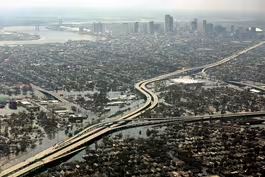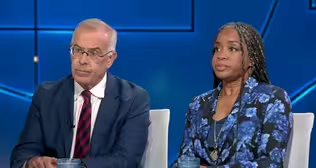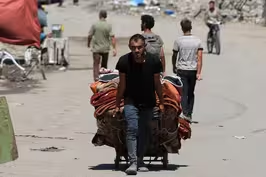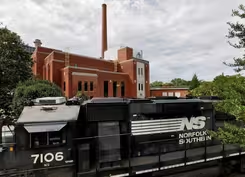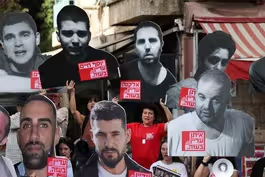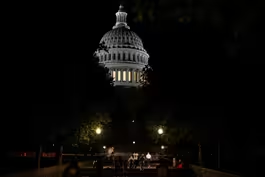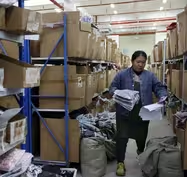
Katrina victims reflect on how the storm changed their lives
Clip: 8/29/2025 | 4m 42sVideo has Closed Captions
Katrina victims reflect on how the storm changed their lives
Friday marks the 20th anniversary of Hurricane Katrina, which decimated New Orleans and communities along the Gulf Coast, leading to one of the largest and most sudden relocations of people in U.S. history. Some 1.2 million Louisianans were displaced for months or even years. We spoke with a few of the thousands of Katrina survivors who relocated permanently.
Problems playing video? | Closed Captioning Feedback
Problems playing video? | Closed Captioning Feedback
Major corporate funding for the PBS News Hour is provided by BDO, BNSF, Consumer Cellular, American Cruise Lines, and Raymond James. Funding for the PBS NewsHour Weekend is provided by...

Katrina victims reflect on how the storm changed their lives
Clip: 8/29/2025 | 4m 42sVideo has Closed Captions
Friday marks the 20th anniversary of Hurricane Katrina, which decimated New Orleans and communities along the Gulf Coast, leading to one of the largest and most sudden relocations of people in U.S. history. Some 1.2 million Louisianans were displaced for months or even years. We spoke with a few of the thousands of Katrina survivors who relocated permanently.
Problems playing video? | Closed Captioning Feedback
How to Watch PBS News Hour
PBS News Hour is available to stream on pbs.org and the free PBS App, available on iPhone, Apple TV, Android TV, Android smartphones, Amazon Fire TV, Amazon Fire Tablet, Roku, Samsung Smart TV, and Vizio.
Providing Support for PBS.org
Learn Moreabout PBS online sponsorshipGEOFF BENNETT: Today marks the 20th anniversary of Hurricane Katrina, which decimated New Orleans and other communities on the Gulf Coast, leading to one of the largest and most sudden relocations of people in U.S. history.
Some 1.2 million Louisianians were displaced for months or even years.
We're going to spend some time now looking at that impact and the ways the city has changed in the two decades since Katrina.
And let's start by hearing from a few of the thousands of Katrina survivors who relocated permanently.
KELLY BOLDING, Texas: My name is Kelly Bolding.
And before Katrina hit, I was living in New Orleans East.
And right now I live in the DFW area.
PHILIP FALCONE, California: My name is Philip Falcone.
When I was in New Orleans, my family, we lived in Metairie, which is a suburb outside of New Orleans.
And then now, post-Katrina, all these years later, live in the city of Riverside, California.
STEPHEN LIPP, Texas: This is Stephen Lipp.
I'm living currently in Katy, Texas, and was living in Orleans Parish in New Orleans, Louisiana.
PAT "MOTHER BLUES" COHEN, North Carolina: I'm Pat "Mother Blues" Cohen.
I was living in New Orleans East, where the storm hit.
And I am now -- since Hurricane Katrina, I have been living in Salisbury, North Carolina.
KELLY BOLDING: I remember my siblings talking about, let's pack up, let's leave, this one is going to be the one.
STEPHEN LIPP: I have no memory of anything prior to the storm.
It was that sort of event.
It was so all-encompassing, so overwhelming.
PHILIP FALCONE: I was a Katrina kid is what we say.
There's a group of us that were like, we were children in the time of Hurricane Katrina.
We remember all that happened, but, of course, were not the ones calling the shots in our respective families.
MAN: Powerful Hurricane Katrina rips across the Gulf Coast.
STEPHEN LIPP: After the storm, we were watching the Weather Channel like 24/7, trying to figure out what's going on in the storm.
And the shot was a street corner very close to where we lived.
And there was 10 feet of water in the street corner.
I looked at everybody in the room and I said, you recognize what this is, don't you?
We have lost everything.
Everything is now gone.
PAT "MOTHER BLUES" COHEN: After Katrina, it was sort of a land grab.
People were coming to New Orleans, and they were buying up the land.
And it was too expensive.
And I didn't know whether I was going to be able to work or not.
I sing blues.
When people would come to New Orleans and they wanted to see some New Orleans entertainment, they called me a lot.
From the storm, what I remember is just coming to North Carolina, being displaced.
I didn't have a job.
I couldn't get a job because I didn't know musicians.
I didn't have any friends.
I didn't know where clubs were.
I didn't know anything.
PHILIP FALCONE: After the hurricane and of course, the evacuation and so forth, my family decided that what was best for both my parents and for us kids was not to return.
I mean, at any moment in time, in hurricane season, of course, a major storm could come through and destroy everything and you're back to square one all over again.
KELLY BOLDING: When I went back after Katrina and I saw my house, and I lost everything from pictures, high school things, my daughter, all of her little things, it just went completely.
I mean, it's gone.
I don't never want to go through that again.
STEPHEN LIPP: Those two months after Katrina hit, we decided to purchase a house and used it.
Well, then comes Harvey.
WOMAN: Hurricane Harvey barreling into the Texas coastline.
STEPHEN LIPP: In hindsight, it was sort of like, this is easy.
Katrina became the measuring stick, and there was nothing that could measure to us.
PHILIP FALCONE: I live in California now, and we are not immune to natural disasters.
It seems like everywhere has something, and you kind of pick and choose where you're going to live and take that gamble of what that natural disaster will be for your particular location.
I will go to my grave being forever marked by the effects of Hurricane Katrina on my life, but on my family's life too.
KELLY BOLDING: In New Orleans, we had communities.
We had friends that turned into family.
I still will visit New Orleans a lot, and one thing that I will visit far is the food and definitely sno-balls.
Sno-balls are a New Orleans dessert.
And I'm like, how about we open up a sno-ball stand?
We're going to treat you like family when you come here.
And that's what New Orleans is about.
20 years later, a look at the legacy of Hurricane Katrina
Video has Closed Captions
Clip: 8/29/2025 | 5m 28s | 20 years later, a look at the legacy of Hurricane Katrina (5m 28s)
Brooks and Atkins Stohr on school shooting response
Video has Closed Captions
Clip: 8/29/2025 | 10m 13s | Brooks and Atkins Stohr on the political response to the Minnesota school shooting (10m 13s)
Cindy McCain describes dire conditions after visit to Gaza
Video has Closed Captions
Clip: 8/29/2025 | 6m 32s | WFP's Cindy McCain describes dire conditions after visit to famine-gripped Gaza (6m 32s)
Democrat warns Trump firing challenges integrity of STB
Video has Closed Captions
Clip: 8/29/2025 | 4m 58s | Democrat warns Trump firing challenges integrity of STB ahead of railway merger decision (4m 58s)
Israeli frustrations rise as war and hostages remain in Gaza
Video has Closed Captions
Clip: 8/29/2025 | 7m 54s | Frustrations rise in Israel as war endures and hostages remain in Gaza (7m 54s)
News Wrap: Trump trying to block $5B approved by Congress
Video has Closed Captions
Clip: 8/29/2025 | 6m 32s | News Wrap: Trump trying to block $5B in foreign aid already approved by Congress (6m 32s)
What consumers can expect as de minimis exemption ends
Video has Closed Captions
Clip: 8/29/2025 | 5m 50s | What consumers can expect as de minimis exemption ends (5m 50s)
Providing Support for PBS.org
Learn Moreabout PBS online sponsorshipSupport for PBS provided by:
Major corporate funding for the PBS News Hour is provided by BDO, BNSF, Consumer Cellular, American Cruise Lines, and Raymond James. Funding for the PBS NewsHour Weekend is provided by...
